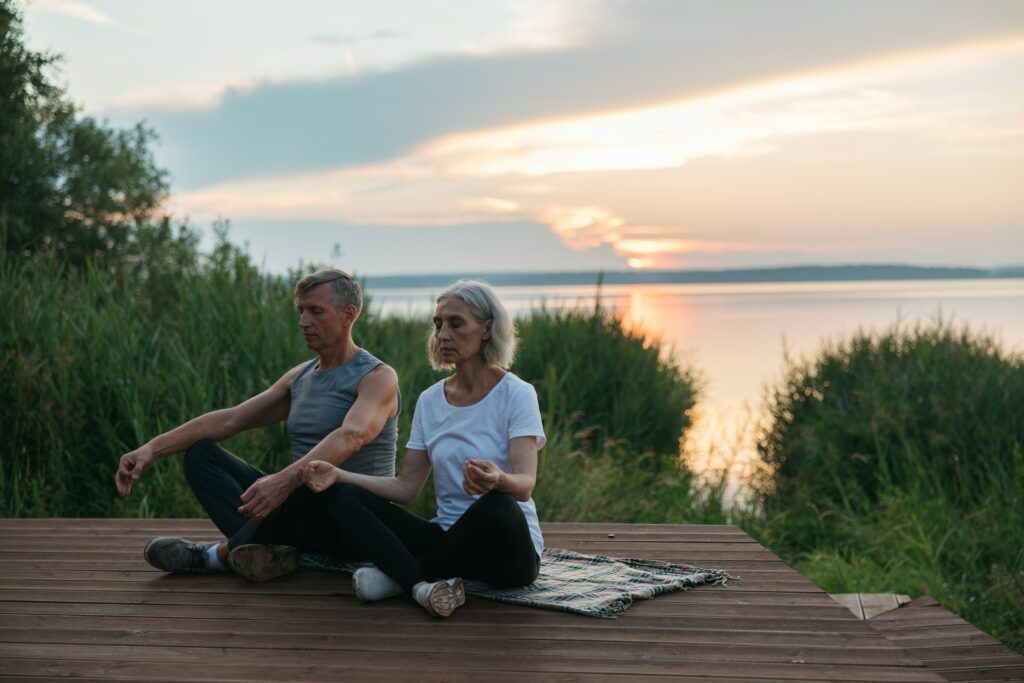Healthy Aging Starts Today: A Guide to Building a Healthier Future
Our bodies and minds will experience many natural changes that can impact our health and well-being as we age. However, aging doesn’t have to mean declining our quality of life. We can age well and maintain an active, fulfilling lifestyle by prioritizing physical, mental, and emotional health.
In this guide to healthy aging, we’ll explore some of the most important factors contributing to a healthy and vibrant life as we age. From exercise and nutrition to social connections and preventative care, this article will provide practical tips and guidance for anyone looking to prioritize their health and well-being as they age.
What’s Healthy Aging and Why Is It Important?
According to the World Health Organization (WHO), healthy aging is “the process of developing and maintaining the functional ability that enables well-being in older age.” This includes physical, mental, and social well-being and the ability to maintain independence and participate in activities that are important to individuals.
Healthy aging is important because as the world’s population ages, there is a growing need to ensure that older adults can maintain their health and well-being. This benefits individuals and their families and has broader societal implications, including reducing healthcare costs and maintaining a productive workforce.
A Review Of Different Aspects Of Healthy Aging
There are different aspects of healthy aging that you need to equally focus on for you to achieve an According to the National Institute on Aging (NIA), several aspects of healthy aging include:
- Physical health – maintaining a healthy weight, eating a nutritious diet, staying physically active, and managing chronic conditions.
- Cognitive health – includes maintaining mental sharpness, learning new things, and engaging in activities that challenge the mind.
- Emotional health – includes managing stress, maintaining positive relationships, and engaging in activities that bring joy and fulfillment.
- Social health – includes staying connected to friends, family, and the community and participating in social activities.
- Spiritual health – includes maintaining a sense of purpose and meaning in life, engaging in activities that align with personal values, and finding ways to connect with something greater than oneself.
The Keys To Healthy Aging: Tips for Mind, Body, and Spirit
Staying healthy and feeling your best during your golden years is more than just keeping the wrinkles at bay. More than eating the right food, doing the right moves, you also need to cope with the changes that accompany aging.
After all, staying on top of your health should also be a state of mind and coming to terms with the changes that will happen to your body, so here are some key ways to improve not just a part of your health but your whole mind, body, and spirit.
Key 1: Learn to embrace changes.
As you grow older, you will experience both happy and difficult phases. It is crucial to strengthen your ability to adapt and discover healthy methods to handle obstacles. This capability will enable you to enjoy the good times to the fullest and maintain a balanced outlook during tough times.
Here’s how you can learn to embrace changes in your life as you age;
- Just focus on the things you’re thankful for. As you grow older, your life technically gets shorter. Although you might feel like you are losing a lot during this stage in your life, it can also make the things you have become even more precious. When you stop taking things for granted, you learn to appreciate and enjoy what you have even more.
- Recognize and express your feelings. Older adults often have a hard time acknowledging their feelings and sharing them with their support network in fear of being seen weak or being a burden to the people they love. However, masking your feelings can lead to stronger negative feelings. So don’t invalidate what you’re going through and look for healthy means of sorting your emotions and feelings.
- Embrace the things you can’t change. Numerous aspects of life are outside our influence. Rather than being anxious about them, concentrate on the aspects that you can manage, such as your response to difficulties. Deal with your restrictions with grace and a reasonable amount of humor.
- Look at the brighter side. When confronted with significant obstacles, attempt to perceive them as chances for individual development. If your own unwise decisions played a role in a stressful circumstance, contemplate on them and use them as lessons to enhance your knowledge.
Key 2: Cultivating Meaning and Joy
One of the crucial components of aging gracefully is to sustain the capacity to derive happiness and significance from life. As you grow older, your life will undergo transformations, and you may gradually lose the things that used to give your life purpose and fill your time.
Such changes may include a job switch, retirement, or separation from children, friends, and family. However, this should not hinder you from progressing forward. The latter part of life can offer thrilling opportunities if you embrace them.
If you’re not sure where to get started, try some of the following recommendations:
- Rekindle an old hobby or explore a new one
- Acquire a new skill such as learning a language, an instrument, or a sport
- Participate in community activities, volunteer for a cause you care about, attend local events
- Venture to a new place or plan a weekend getaway
- Spend time in nature through activities like hiking, camping, skiing or dog walking
- Engage with art by visiting museums, concerts, plays, book groups, or taking art classes
- Document your life experiences by writing memoirs or a play
The possibilities are limitless. What’s important is to find activities that are both meaningful and enjoyable for you.
Key 3: Connect more with people
One of the primary obstacles of aging is sustaining social connections. Even individuals who have always been sociable may find it difficult to stay connected as they age due to various factors such as retirement, illness, or relocating away from close friends and family.
However, staying socially engaged is crucial for physical and mental well-being as you age. It’s essential to have a diverse group of people who can offer companionship and support during times of loneliness, depression, disability, hardship, or loss.
Some ways you can do to stay connected are;
- Stay in touch frequently with loved ones and friends.
- Be open to making new friendships.
- Make an effort to spend time with at least one person every day.
- Engage in volunteer work.
- Seek out support groups during challenging times of change.
Key 4: Stay active and Improve Vitality
It is a false notion that aging inevitably leads to a decline in physical well-being. Although the aging process involves physical changes, it does not necessarily mean that one has to suffer from discomfort and disability.
While some illnesses or pains may be unavoidable, many of the physical issues that come with aging can be effectively managed or reduced by practicing self-care, adopting a healthy diet, and engaging in regular exercise.
Here are some key ways on how to preserve your health as you age;
- Stay physically active: As you age, it can be easy to find excuses to skip being active and just slow down. However, exercise is vitally crucial for seniors. Regular exercise can help maintain strength and flexibility, reduce the risk of chronic diseases, and improve mood and overall well-being for older adults.
The Centers for Disease Control and Prevention (CDC) recommends at least 150 minutes of moderate-intensity aerobic activity per week and muscle-strengthening exercises at least two days per week.
Read also: Mobility Activities That Might Help Preventing Being Immobile
- Eat a nutritious diet: A healthy diet can help maintain a healthy weight, reduce the risk of chronic diseases, and improve energy levels. The National Institute on Aging (NIA) recommends a diet with plenty of fruits, vegetables, whole grains, lean protein, and low-fat dairy products.
- Get enough sleep: Adequate sleep is important for overall health and well-being, including maintaining cognitive function and reducing the risk of chronic diseases. The National Sleep Foundation recommends 7-9 hours of sleep per night for older adults.
- Manage chronic conditions: Chronic conditions such as diabetes, high blood pressure, and arthritis are common in older adults and can significantly impact health and quality of life. Working with a healthcare provider to manage these conditions and maintain optimal health is important.
Read Also: Most Common Diseases in Older Adults: How to Prevent and Manage
- Go to the doctor regularly: To maintain good health at one age, it is crucial to visit the doctor regularly for health screenings. According to a study conducted in 2021, regular check-ups enable physicians to detect chronic illnesses early and help patients minimize risk factors for diseases, such as elevated blood pressure and cholesterol levels. Individuals who adhere to regular doctor’s visits also report enhanced quality of life and a sense of well-being.
- Quit smoking and drinking: Vices including smoking, alcohol, and other substance consumption can harm your health. Hence, quitting smoking and limiting alcohol can benefit your health and add years to your life.
Key 5: Stay mentally active
There are many great reasons to keep your brain as active as your body. The NIH states that engaging in mentally stimulating activities such as reading, playing games, and learning new skills can help maintain cognitive function and reduce the risk of cognitive decline. This statement holds particularly true if your profession is no longer intellectually stimulating or if you have entirely retired from your work.
- Challenge your brain.
- Diversify your habits.
- Venture on a completely new subject.
Aging well and healthily is not just about preserving your appearance but in nurturing your holistic well-being as well. Try to maintain a healthy lifestyle, surround yourself with a positive support network and continue doing things that make you happy.
It’s natural to get worried about the challenges that aging can bring from time to time, so don’t think twice about sharing your concerns to someone and recognize your feelings.
Ageless Insights: Fast Facts About Health and Aging
Here are some fascinating facts about health and aging that may challenge some common beliefs and shed light on how we can age gracefully.
Continue reading to discover additional information about the studies conducted and actions you can take to encourage and maintain healthy aging.
Physical Activity
- According to a study, walking at least 8,000 steps per day, as opposed to 4,000 steps, was linked to a 51% lower risk of death from any cause in adults aged 40 or above.
- Exercise may help prevent muscle function decline related to aging, regardless of age, according to a 2019 investigation of data from the Baltimore Longitudinal Study of Aging conducted by researchers.
- According to another study, in adults over 55, muscle mass was a better predictor of longevity than weight or body mass index (BMI).
Diet
- Following a Mediterranean-style eating pattern was strongly linked to a reduced risk of sudden cardiac death in more than 21,000 participants studied in 2021.
- Studies testing the Dietary Approaches to Stop Hypertension (DASH) have found that it lowers blood pressure, helps people lose weight and decreases the risk of type 2 diabetes and heart disease.
- According to researchers, those who closely adhere to the MIND diet have better overall cognition, including the ability to think clearly, learn, and remember, than those who follow other eating styles.
- According to one study, a diet low in vegetable oil and high in fatty fish may alleviate migraine headaches in 182 older adults who experience them frequently.
- According to another study, the consumption of green leafy vegetables was significantly linked to slower cognitive decline in almost 1,000 older adults over a five-year period.
Sleep
- A study of older adults found that those with poor sleep quality struggled with problem-solving and concentration more than those with good quality sleep.
- Another study found that those in their 50s and 60s getting six hours of sleep or less a night increased the risk of developing dementia later in life.
- Also, a study found that older adults who did not sleep well and napped often were at a greater risk of dying within the next five years.
Smoking, Alcohol Consumption, and Other Substances
- Quitting smoking between the ages of 45 and 54 resulted in living about six years longer than those who continued smoking while quitting between the ages of 55 and 64 resulted in living about four years longer.
- A study found that alcohol-dependent individuals showed signs of premature aging in certain brain regions.
- Misuse of prescription opioids or benzodiazepines is associated with suicidal thoughts in adults aged 50 and older, according to a study.
Social Isolation
- Being socially isolated or lonely as an older adult is associated with a higher risk of heart disease, depression, and cognitive decline, according to a study.
- Lastly, a study found that loneliness was associated with a greater risk of heart disease in adults over 70, while socially isolated older adults experienced more chronic lung conditions and depressive symptoms than those with social support.
- A recent study discovered that older adults who lack social support have a higher risk of experiencing chronic lung conditions and depressive symptoms than socially connected ones.
- Loneliness is linked to a faster decline in cognitive abilities, according to a study of more than 8,000 adults aged 65 and above.
- Making new social contacts is associated with better self-reported physical and psychological well-being, as a study of over 3,000 older adults found.
Mental Health
- Research suggests chronic stress can alter the brain, affecting memory and increasing the risk of Alzheimer’s or related dementias.
- A meta-analysis supported by the National Institute of Mental Health indicates that stress and anxiety can rewire the brain in ways that impact memory, decision-making, and mood.
- According to a review article funded by the National Heart, Lung, and Blood Institute, depression can increase the risk of heart disease and metabolic disorders, based on hundreds of studies conducted worldwide.
- A 2020 longitudinal study demonstrated that a positive mood is linked to better cognitive control.
Although aging is an inevitable part of life, it doesn’t mean we have to sacrifice our health or quality of life. With the right mindset, knowledge, and lifestyle choices, we can age gracefully and enjoy a fulfilling life at any age. Remember to prioritize your health and well-being, and continue to seek out new information and resources that can support your aging journey.
Bottomline
In conclusion, healthy aging is not only about living longer but also about living well. With proper care and attention, older adults can maintain good physical, cognitive, and emotional health. The tips outlined in this guide, including regular exercise, healthy eating, stress management, and preventive care, can help individuals age gracefully and enjoy a fulfilling life.
It is never too late to start taking steps towards a healthier lifestyle, and by doing so, older adults can maintain their independence and continue to enjoy all that life has to offer. By prioritizing healthy aging, individuals can maximize their years and live long and fulfilling lives.
To learn more about aging you may also visit our article on Old Age Problems: A Guide To Everything You Need To Know.






